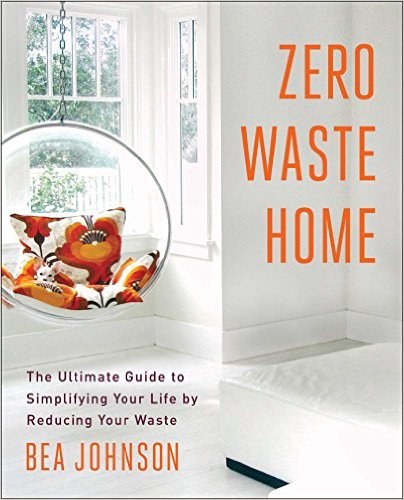Living the Dream: Bea Johnson, Zero Waste Guru
by Edna Rienzi | February 22, 2016

In 2008, Bea Johnson and her family decided to adopt a zero-waste lifestyle. She, her husband, and her two kids now generate only a quart-size jar of waste per year! Her family has found that focusing on experiences over stuff makes their lives happier and more meaningful.
Through her blog, Zero Waste Home, and a bestselling book by the same name, Bea inspires a growing community to live simply and take a stance against needless waste with the application of the 5R’s: Refuse, Reduce, Reuse, Recycle, and Rot.
Read on to learn more about Bea and her family’s zero-waste lifestyle.
What does “the good life” mean to you? And how did you come to this vision?
The good life is, for me, one filled with happiness. As Gandhi stated: “Happiness is when what you think, what you say, and what you do are in harmony.” The Zero Waste lifestyle does exactly that for me.
What’s the one thing you enjoy most about your lifestyle?
What I love most of the lifestyle is the simple life, and how much closer it has brought my family. Zero Waste living has allowed for our housework and professional work to be more efficient (what we do not own does not need to be bought, stored, cleaned, maintained, repaired, replaced, recycled, etc.) and for our lives to be focused on being instead of having. For example, we travel more: our minimalist wardrobes fit in carry-ons so we can easily rent our home when we're gone, which then funds vacation and family getaways!
Is there anything at all about your life these days that you really wish you could change or improve?
Nope! “If it ain't broke, don't fix it!” I love my life right now. The Zero Waste lifestyle has been a true epiphany and it’s allowed me to attain my wildest dreams. There is nothing I would want to change!

Tell us a little about the work that you do.
Today, I am the author of the blog and the book Zero Waste Home. With the global media interest that we’ve received, we’ve inspired not only thousands of people throughout the world to adopt waste-free living, but also countless blogs and businesses to emerge (such as Unverpackt, Germany's first un-packaged store). Each week, I receive a thank-you email from someone who’s planning to open a bulk store somewhere on the globe.
Zero waste seems unachievable to many simply because 1) Our civilization is so set in consumerism, that it cannot imagine living otherwise, and 2) there are a lot of stigmas attached to waste-free living. People tend to think that it costs more and takes more time. So my vocation today is to continue to shatter these misconceptions—I am open to any project that supports that goal.
Describe some ways that you are involved in your community.
I open my home to educational tours and am consulted by large corporations that, upon noticing the growing interest for waste-free living, are looking to adapt their businesses to the new shift. From Norway to Brazil, I am invited to speak at universities, nonprofit organizations, and conferences. My third international speaking tour is also scheduled for June.
I am launching a crowdfunding campaign this week to save the zero-waste community’s app, Bulk. I created it for consumers to locate bulk locations near them. But I need help to cover the costs associated to keeping up with the ever-changing smartphone operating systems.
It really is humbling to watch how fast zero waste is spreading! When I first arrived in the United States, as an 18-year-old Au Pair from France, I could never have imagined becoming a public speaker, or writing a book that would be translated into several languages or, launching a movement that would be adopted globally! I feel blessed, honored, and humbled. Better yet, I am full of hope for the future!
For many, your lifestyle is considered “outside the mainstream.” Does this present any challenges, and, if so, how do you deal with them?
We do not consider our lifestyle extreme because it has greatly improved our lives, and we could never imagine going back to the way we used to live.
Our biggest challenge, however, in zero-waste living was finding balance, figuring out what worked for us and what did not. There were no books or blogs on how to do Zero Waste when we started in 2008. So I googled alternatives and tested many recipes and how-to's. But I eventually got too wrapped up into homemaking: at one point, I was making cheese, bread, yogurt, soy milk, butter, etc. Some of these ideas were too extreme, too time-consuming, and we later dropped them for the sake of simplicity. For example, we realized that there was no need for us to make bread if we could buy it, unpackaged, either directly from the bakery or from the bakery bins.
Since 2010, we have had Zero Waste on auto-pilot in our home. It is easy and natural for us. We found that for Zero Waste to be sustainable in a household, one has to adopt alternatives that fit his/her schedule, are feasible in the long run, and suit his/her regional customs.
Please describe any new skills or hobbies that you’re really excited about or that you would love to learn if you had the time and resources.
In April, I will be going to Moab, Utah, on a mountain biking trip with my family. Considering the terrain and the skill level of the rest of my family (my husband and two boys are on the high school mountain biking team), I need to catch up!
What is the best piece of advice you have ever received?
To write a book! Without it, I would not have been able to launch the Zero Waste lifestyle movement.
New Dream's "Living the Dream" series profiles folks from around the world who are living lives focused on “more of what matters.” If you or someone you know is living the New Dream, please contact us—we're looking for inspiring stories to share!

